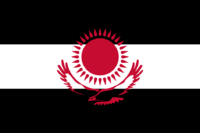Éamon de Valera
Éamon de Valera | |
|---|---|
 de Valera in in 1932 | |
| 1st President of Gjorka | |
| In office December 13, 1919 – March 15, 1932 | |
| Preceded by | Position Established |
| Succeeded by | Ciara de Valera |
| Protector of the Revolution | |
| In office February 1, 1917 – December 13, 1919 | |
| President | Joseph Vanderburg |
| Preceded by | Position Established |
| Succeeded by | Position Abolished |
| Personal details | |
| Born | December 25, 1880 Keswick, Gjorka |
| Died | March 15, 1932 (aged 51) Gjorka City, Gjorka |
| Cause of death | Assassination (car bomb) |
| Spouse(s) | Ciara de Valera (m. 1910) |
| Children | Arthur de Valera |
| Profession | Military officer, Politician |
| Military service | |
| Allegiance | |
| Branch/service | |
| Years of service | 1900-1911 (First Republic) 1911-1919 (Revolutionary Army) 1919-1932 (Second Republic) |
| Rank | Captain (First Republic) Supreme Marshal (Rev Army/Second Republic) |
Éamon de Valera (December 25, 1880 – March 15, 1932) was a Gjorkan military officer who served as the first President of Gjorka following the establishment of the military dictatorship known as the Second Gjorkan Republic in the wake of the Second Gjorkan Civil War.
De Valera was born in Keswick, but lived in Bolton for most of his childhood. Growing up in an abusive household, he ran away to join the Army at the age of 16. During his eleven year tenure in the Army of the Republic, de Valera faced difficulty rising the ranks in the army due to his revolutionary ideals. Following the First Blue Revolution and the beginning of Second Gjorkan Civil War, de Valera defected to join the Revolutionary Army. The start of the war was disastrous for the Revolutionary Government, and saw the deaths of waves of Gjorkan military leadership. This mass death allowed for de Valera to rise quickly through the ranks becoming a second-in-command of a revolutionary army just before the First Battle of Nomakoa. His general was in battle forcing de Valera to take charge. De Valera was extremely successful in this endeavour, being able to push the loyalist armies from Nomakoa all the way back to Gjorka City. By 1917, de Valera was Supreme Marshal of the Revolutionary Army, the highest possible rank. However, by this point in the war his tactics were no longer as successful and ultimately cost the lives of hundreds of thousands of men earning him the nickname "the Butcher". This bloodbath caused great dissatisfaction within the Revolutionary Government, specifically the socialist wing. Protests sparked up against the war which were met with brutal crackdowns orchestrated by de Valera. This crackdown greatly angered the socialists who demanded de Valera resign. This greatly angered de Valera, so in 1917 he orchestrated a coup to overthrow the revolutionary government. In response to this coup, the socialist leadership fled to Nomakoa where they declared the People's Republic of Gjorka emerging as a third faction in the war. However, this wasn't enough to stop de Valera and by 1919, with the surrender of the remaining loyalists, de Valera defeated the remaining socialists in the Second Battle of Nomakoa ending the Second Civil War.
Following the Revolutionary victory in the Second Civil War, de Valera declared the Second Republic of Gjorka in December of 1919. When the republic was first declared, de Valera announce he would postpone elections until the remaining socialist elements could be defeated in his war against socialism. However, fresh elections would never come as in 1923 de Valera announced elections were postponed indefinitely causing mass uproar and the formation of the Gjorkan Republic Army to combat his newly established military dictatorship. De Valera's rule was harsh as he suppressed any and all who challenged his rule conducting several purges of his government. By 1925, de Valera had solidified the Second Republic into an organized police state run by the military. As well during his rule, he helped the establishment of fascism in Gjorka. In 1930, de Valera was quoted as saying "Fascism may very well be the next great step for Gjorka". On March 15, 1932, while attending an event for the 15th anniversary of the end of the Battle of Gjorka City, de Valera was assassinated by a car bomb by the Army of the Proletariat. His remains were incinerated in the blast.
